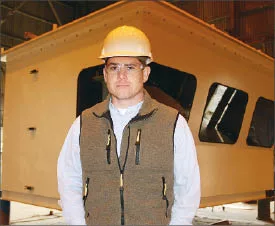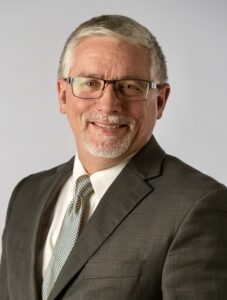A new era at old R.A. Hanson
Now The Factory Co., venerable operation under new owner

When Richard Hanson sold off the name and materials-handling business of RAHCO International Inc. to a Danish conglomerate in 2007, he was content in the twilight of his career running what was left of the heavy-equipment maker—now called The Factory Co.—as a contract manufacturer.
Last month, Hanson, 62, retired and sold that company, too, and its new owner, 36-year-old Mark Folsom, has dreams of returning the operation to its former glory as an inventive designer and manufacturer of specialty industrial equipment, this time focused on the oil-and-gas industry.
The operation, housed in a sprawling industrial complex on Magnesium Road on Spokane's North Side, dates back to 1946, when Hanson's father, Raymond Hanson, founded R.A. Hanson Co. after inventing a self-leveling device that enabled agricultural combines to operate on steep hillsides. Over the years, the company did everything from hiding MX missiles underground for the Pentagon, to digging canals in remote parts of the world, to building huge, 2,000-foot-long ore conveyors.
Richard Hanson bought the company from his father in 1995, after it had become known as RAHCO International, and operated it for more than a decade before selling off the company's assets related to the engineering and sale of big conveyors, stackers, and other equipment used in the mining industry. The buyer, a U.S. subsidiary of Copenhagen, Denmark-based FLSmidth & Co. A/S, put those assets into a new company it launched here called FLSmidth RAHCO Inc., which continues to design and sell such equipment worldwide.
FLSmidth RAHCO now is The Factory Co.'s biggest customer, providing it with about three quarters of its volume, says Folsom, who owns the business with his wife, Heidi, and also owns a small machine shop here called Folsom Manufacturing, which his father, Terry, started 30 years ago.
Operating mostly as a contract manufacturer, however, has been difficult financially for The Factory Co., says Folsom. Margins, he says, are much thinner for companies that don't engineer their own products, which makes it hard to weather the ebbs common in the heavy-equipment industry. Folsom, who became general manager of the company in February as part of his due diligence in buying it, says the operation has had to lay off more than 30 workers this year, leaving it with about 75 employees.
"We're working at much more competitive margins," he says. "We'd need to fill our shops to the doors, completely full of work," to make it on the smaller margins.
To combat that, Folsom wants The Factory Co. to get back into the business of designing and building equipment of its own, which it plans to do initially in the oil-and-gas industry. The former RAHCO International had begun building oil drilling rigs for a Canadian energy company about 18 months before the big asset sale to FLSmidth, and retained that part of its business after the sale.
The Factory Co. has built seven oil rigs for the Canadian customer, all of which now are in operation in Texas. It also has manufactured components for rigs made by other companies, Folsom says.
He says of the Canadian customer, which he declines to identify, "They were very happy with our fabrication. They said we built the straightest mast of any that they had ever seen. That contract brought in several other inquiries."
Now, The Factory Co. is bidding on what could be the largest contract it has ever had, he says. A potential customer that Folsom declines to name plans to construct 38 large-scale drilling rigs in Siberia by 2011, and would like to have five of those rigs up and running by the end of next year.
Such rigs, which would be enclosed to withstand cold weather and would have 120-foot-tall drilling masts, sell for about $20 million each, Folsom says.
The company also is bidding to build smaller rigs for two other potential customers, he says.
"We only need one of those three contracts to make 2009 a really good year," Folsom says. "You couldn't take all three; that would be way too much for any one company."
He says he could hear about those contracts within the next month.
Folsom says The Factory Co. has become certified by the American Petroleum Institute to make drilling rigs, putting it among relatively few companies internationally with that certification. "We want to be in the oil-and-gas industry, we want to be a big player," he says.
If the company is able to get any of the oil-rig work it's seeking, it likely will be back to 100 employees by the end of the year, Folsom says, adding that he can't even speculate how many people will be needed at the factory if it gets the big contract for the Siberian rigs.
"We'd have to subcontract out some of that work," he says.
Oil rigs are large pieces of equipment. Even for the smaller rigs the company has made so far, the parts fill 18 tractor-trailer rigs when they're ready for shipment. "I haven't even thought about how many trucks it will take" to deliver rigs to Siberia, Folsom says.
Meanwhile, Folsom says he'd like to begin to ramp back up the company's engineering department, after losing the guts of it as part of the sale of the materials-handling division to FLSmidth. The company now employs just two drafters and an engineer, but is looking to hire more.
Hiring for those positions, as well as for welders, machinists, electricians, and hydraulic specialists would ramp up quickly if the company lands any of the big oil-rig projects for which it's bidding, he says.
Also, Folsom would like to change the company's name. He says he would like to have a better brand to market as the company begins to design equipment that ultimately will end up in the field emblazoned with its name, rather than that of another manufacturer for which it's doing work. He declines to speculate on what the new name will be, except to say "Folsom" won't be in it and that the word "energy" likely will be. He says he hopes to have a new name in place by the end of this year.
Folsom says The Factory Co. will continue to do contract manufacturing as it moves back into engineering its own products, but will stay clear of the materials-handling business it sold to FLSmidth.
Meanwhile, the company also can continue to make and sell the heavy-duty forklifts and road graders it developed and markets under the brand name hMach, as well as the conversion kits it still makes that enable combines to harvest grain on steep hillsides. Folsom says the company sold about six road graders this year, but hasn't been selling any of the big forklifts, which are intended for seaports, steel yards, and concrete plants. It's selling about two dozen combine conversions a year, some of which it installs at its factory on Magnesium Road and others which are sold to an ag-equipment dealer and installed elsewhere.
The Factory Co. leases the complex it occupies on Magnesium from Raymond Hanson.
Folsom says he was introduced to Richard Hanson about a year ago, not long after the FLSmidth acquisition.
"We hit it off pretty good," he recalls. "Our personalities matched up. Our styles were similar. It's been a good transition, I think."
Reached by telephone at his winter home in Arizona, Hanson said, "Mark has some pretty good ideas. He's a pretty capable guy."
He added, "When I took over the company from my father, there were those questions about whether the company could survive without Raymond. It did pretty well. So there's going to be a certain amount of questions about how well the company will do without me. But it's not about one person—it's about the people in the business. I'm very proud of the crew there. I don't think the business will suffer without me being there."
Folsom, who has a finance degree from the University of Utah, says he still spends about an hour a day helping to manage Folsom Manufacturing, which is located south of Spokane Valley and employs six people. The small machine shop, which Folsom bought from his father in 2000, primarily makes components for cooling towers at oil refineries and power plants around the world, but also does some work for wood-stove manufacturers.
He also is one of three owners of a small business in Spokane Valley called Full Throttle Inc., which has developed an aftermarket hand throttle for snowmobiles and all-terrain vehicles, and sells them through dealerships and via its Web site, at www.fullthrottleinc.com.
Folsom Manufacturing has always had a reputation as a "problem solver," making items that can't be "bought off a shelf," he says. "That same type of mentality is what I will bring to this" company, Folsom says of The Factory Co.
He says he grew up in the machine-shop business, working for his father and hearing about the legacy of R.A. Hanson.
"I'm honored and thrilled to death to be part of such a great company that been around for so long," he says.
Hanson, meanwhile, says it was the right time to hand the business off to the next generation.
"My wife and I talked about this a lot, and decided that while we're still healthy, if there's an opportunity to slow down our lives, now would be a good time."
The couple plans to use their second home in Chandler, Ariz., just outside Phoenix, as a base to tour the country.
"We've traveled all over the world for business, but not much in the U.S., so we'd like to do some of that."
Related Articles
Related Products


_c.webp?t=1763626051)
_web.webp?t=1764835652)

